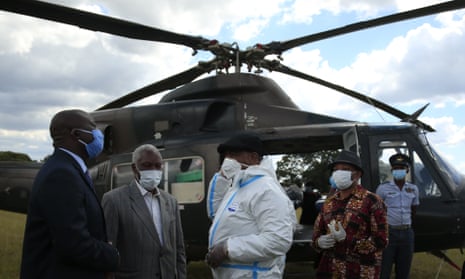At least 131 people have died from malaria in Zimbabwe in a new outbreak, adding pressure to a country already struggling to deal with Covid-19.
The fatalities occurred in 201 outbreaks recorded across the country, according to the Ministry of Health. Meanwhile Zimbabwe’s lockdown has been extended by two weeks to prevent the spread of coronavirus.
“The cumulative figures for malaria are 135,585 [cases] and 131 deaths. A total of 201 malaria outbreaks have been reported throughout the country, mostly from malarious provinces such as Manicaland, Masvingo and Mashonaland East,” reads a report seen by the Guardian.
Malaria transmission is seasonal and unstable, causing sickness and death across all age groups. In Zimbabwe, epidemics occasionally occur during the warm and wet season, particularly in February, March and April.
Health experts predict the figures will continue to rise across the country, although the true figures may well be masked by families being unable to access clinics or failing to report cases.

Zimbabwe had seen a decline in malaria, but its success began to reverse within the past few years. Malaria accounts for between 30% and 50% of outpatient appointments in malaria-prone areas, according to the Ministry of Health.
The World Health Organization (WHO) has warned Zimbabwe that there is a risk of paying less attention to diseases such as malaria while fighting Covid-19.
“During the Covid-19 pandemic, the malaria community must remain committed to supporting the prevention of malaria infection, illness and death through preventive and case management services, while maintaining a safe environment for patients, clients and staff. Deaths due to malaria and its comorbidities (anaemia, undernutrition, etc) must continue to be prevented,” said a recent WHO report.
Malaria, along with Aids and TB, is one of the biggest killers in Zimbabwe. However, unlike Covid-19, the disease is treatable at local level using rapid diagnostic tests.
The recent outbreak comes as the country’s health system faces a serious shortage of drugs amid worsening economic conditions.
The health system is at risk of crashing in case of a widespread Covid-19 outbreak. The virus has to date infected 25 people, killing three.
Zimbabwe’s health sector has been crippled since last year after months of strikes over poor working conditions, with doctors claiming that patients were dying due to lack of medical supplies. Two weeks ago, the government was taken to court over its failure to provide doctors working on the frontline of the Covid-19 pandemic with masks.
Zimbabwe’s once vibrant health system has collapsed over the past two decades, largely due to an economic crisis. This has raised doubts over the country’s ability to cope with the coronavirus and a possible malaria outbreak.
The country entered a second phase of the national lockdown on Monday with a 14-day extension. Authorities say they want to scale up testing which has so far remained low due to inadequate testing kits.
